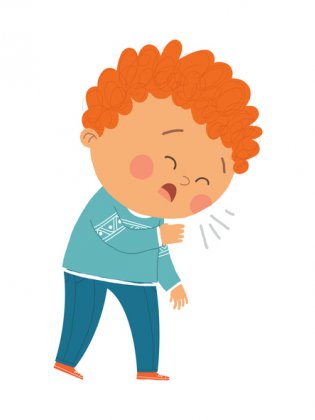Allergies in Children
An allergy is the body’s overreaction to a foreign substance. This substance, or allergen, can enter the body any number of ways: by the nose or mouth (respiratory allergens), on the skin (“contact” allergens) or via the digestive system (food allergens). Depending on the route of entry and the organ affected, the allergic symptoms will vary.
With more than 40 years of experience, Dr. Jocelyne Just, a pediatric allergist at the American Hospital of Paris, treats severe allergic pathologies requiring biotherapeutic treatment, as well as mild to moderate allergies which can be managed over the long term through desensitization.
What should I know about allergies in children?
An allergy is a pathology that affects the skin, the mucous membranes (bronchial tube; larynx; oropharyngeal and digestive mucosa) and, in its most severe forms, the circulatory system.
Mild allergies affect an organ and have little impact on quality of life, while severe forms often consist in multiple allergies affecting several organs such as the lungs, nose, skin and digestive tract. Severe allergies begin in early childhood and continue throughout childhood and beyond if they are not treated appropriately.
Allergies are genetic but are also influenced by environmental factors (loss of biodiversity, pollution), which explains the current sharp increase in these diseases.
What are the symptoms of allergies in children?
Asthma
- Chronic cough, especially at night
- And/or difficulty breathing, especially when exercising
- And/or breathing noises such as wheezing
- Warning signs include bronchiolitis, recurrent bronchitis, isolated difficulty breathing while exercising and an isolated cough
Food Allergies
- Urticaria
- Swelling in the face or respiratory organs (such as the larynx)
- Digestive symptoms such as vomiting or diarrhea
- Difficulty breathing (rhinitis or asthma)
- In severe cases, fainting or drop in blood pressure
Atopic eczema is a chronic condition (that comes and goes)
- That itches
- That affects the insides of the elbows, the area behind the knees, in front of the ankles, under the buttocks, around the neck, eyes and ears and, in infants, the cheeks
Allergic rhinoconjonctivitis
- Sneezing, runny nose or congested nose when the child has neither a cold nor the flu
- Sometimes combined with watery, itchy eyes
Urticaria (hives)
- Red, raised, itchy rash that comes and goes intermittently
How are allergies diagnosed at the American Hospital of Paris?
At the American Hospital of Paris, personalized ambulatory care for young patients is based on an accurate diagnosis reached following a series of complementary tests. Patient education is also carried out by dedicated trained professionals such as a dietician, psychologist, pediatric nurse and teacher.
For asthma, diagnostic tests include pulmonary function testing, chest X-ray or chest CT scan for severe cases, a precise allergy assessment (skin tests, immunoglobulin blood test) and a specialized ENT check-up.
Patients with a single or multiple IgE-mediated food allergy and/or anaphylactic food allergy will undergo an in-depth allergologic investigation based on skin tests using native allergens and complex immunologic assays (measuring IgE antibodies in response to molecular allergens, basophil degranulation).
What treatments for allergies are available for children at the American Hospital of Paris?
Our ambulatory department delivers multidisciplinary care, making it possible to define a personalized treatment for each patient. Our highly qualified professionals (doctor, pediatric nurse, psychologist, dietician) share medical decisions with patients and their families after providing information to them on how to manage the allergy.
Patients with single or multiple IgE-mediated food allergies and/or anaphylactic food allergies benefit from comprehensive patient education initiatives as well as oral immunotherapy or desensitization protocols.
Special emphasis is placed on providing care to patients with multiple or severe allergies who require biotherapy, commenced on an outpatient basis.
Today in France, one person out of four has an allergy. The number of people living with one or more allergies has doubled over the past 20 years. In 40 years, this figure was multiplied by five and concerns nearly 18 million people in France today.
A rising number of people (15-20% of those with allergies) suffer from severe allergies caused by asthma attacks, severe atopic eczema, multiple food allergies, food anaphylaxis and, though rare in children, drug-induced anaphylaxis. A severe, potentially fatal allergy can also be triggered by an insect bite or sting.
By 2025, 50% of the population will have an allergy, incurring a significant socio-economic cost. More than 10% of all children are asthmatic, 15 to 20% of very young children suffer from eczema, 4 to 8% of preschool-aged children have a food allergy, and 20% of the general population suffers from allergic rhinitis.
Asthma affects more than 3 million people in France, including more than 750,000 children. Asthma is currently responsible for 1,000 deaths annually. Despite improved treatment efficacy (in theory at least), these figures are stable or on the rise. The annual cost of asthma treatments is estimated at €1.1 billion, mainly associated with the more severe forms of the disease: severe asthma accounts for 10% of all asthmas, but 90% of expenditure relating to this disease.

Book an appointment
Learn moreLe point sur les allergies chez l'enfant
